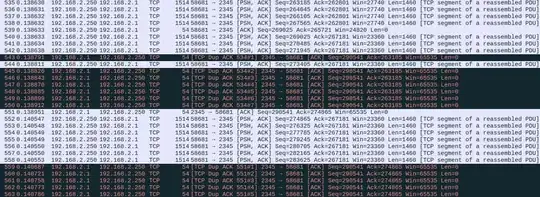edit: there were actually 2 problems, a buggy TCP implementation on the device running the RTOS and an issue causing the Linux network stack to receive the TCP fragments out of order when more than 1 core was active.
I have a sender on IP 192.168.2.250 running some embedded RTOS and a receiver running Linux 4.9.x on IP 192.168.2.1
The receiver is configured as a Wireless AccessPoint and the sender is directly connected to the receiver through WiFi.
I have made a tcpdump on the receiving side during a TCP data transfer and I'm noticing quite a lot of duplicate ACKs being sent by the receiver without actual packet loss occurring (or at least that's what I think, because I see no retransmissions and the ACKs eventually follow the sent sequence numbers).
Anybody an idea what might be causing the receiver's behaviour?
Edit: you are not seeing fast retransmissions from the sender because I turned them off to prove that the stream is not missing data (and throughput went up a lot by doing that). One explanation would be that the packets are seen out of order by the tcp stack. Can I make Linux more tolerable to out of order packets? As in not sending dup acks immediately.
output of sysctl net | grep tcp
net.ipv4.tcp_abort_on_overflow=0
net.ipv4.tcp_adv_win_scale=1
net.ipv4.tcp_allowed_congestion_control=cubic reno
net.ipv4.tcp_app_win=31
net.ipv4.tcp_autocorking=1
net.ipv4.tcp_available_congestion_control=cubic reno
net.ipv4.tcp_base_mss=1024
net.ipv4.tcp_challenge_ack_limit=1000
net.ipv4.tcp_congestion_control=cubic
net.ipv4.tcp_delack_seg=1
net.ipv4.tcp_dsack=1
net.ipv4.tcp_early_retrans=3
net.ipv4.tcp_ecn=2
net.ipv4.tcp_ecn_fallback=1
net.ipv4.tcp_fack=1
net.ipv4.tcp_fastopen=1
net.ipv4.tcp_fin_timeout=60
net.ipv4.tcp_frto=2
net.ipv4.tcp_fwmark_accept=0
net.ipv4.tcp_invalid_ratelimit=500
net.ipv4.tcp_keepalive_intvl=75
net.ipv4.tcp_keepalive_probes=9
net.ipv4.tcp_keepalive_time=7200
net.ipv4.tcp_limit_output_bytes=262144
net.ipv4.tcp_low_latency=0
net.ipv4.tcp_max_orphans=16384
net.ipv4.tcp_max_reordering=300
net.ipv4.tcp_max_syn_backlog=128
net.ipv4.tcp_max_tw_buckets=16384
net.ipv4.tcp_mem=332494433366498
net.ipv4.tcp_min_rtt_wlen=300
net.ipv4.tcp_min_tso_segs=2
net.ipv4.tcp_moderate_rcvbuf=1
net.ipv4.tcp_mtu_probing=0
net.ipv4.tcp_no_metrics_save=0
net.ipv4.tcp_notsent_lowat=4294967295
net.ipv4.tcp_orphan_retries=0
net.ipv4.tcp_pacing_ca_ratio=120
net.ipv4.tcp_pacing_ss_ratio=200
net.ipv4.tcp_probe_interval=600
net.ipv4.tcp_probe_threshold=8
net.ipv4.tcp_recovery=1
net.ipv4.tcp_reordering=3
net.ipv4.tcp_retrans_collapse=1
net.ipv4.tcp_retries1=3
net.ipv4.tcp_retries2=15
net.ipv4.tcp_rfc1337=0
net.ipv4.tcp_rmem=4096873806291456
net.ipv4.tcp_sack=1
net.ipv4.tcp_slow_start_after_idle=1
net.ipv4.tcp_stdurg=0
net.ipv4.tcp_syn_retries=6
net.ipv4.tcp_synack_retries=5
net.ipv4.tcp_syncookies=1
net.ipv4.tcp_thin_dupack=0
net.ipv4.tcp_thin_linear_timeouts=0
net.ipv4.tcp_timestamps=0
net.ipv4.tcp_tso_win_divisor=3
net.ipv4.tcp_tw_recycle=0
net.ipv4.tcp_tw_reuse=0
net.ipv4.tcp_use_userconfig=0
net.ipv4.tcp_window_scaling=1
net.ipv4.tcp_wmem=4096163844194304
net.ipv4.tcp_workaround_signed_windows=0
